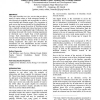Free Online Productivity Tools
i2Speak
i2Symbol
i2OCR
iTex2Img
iWeb2Print
iWeb2Shot
i2Type
iPdf2Split
iPdf2Merge
i2Bopomofo
i2Arabic
i2Style
i2Image
i2PDF
iLatex2Rtf
Sci2ools
97
Voted
INTERACT
2007
2007
An E-gov Service for Retirement Applying by Illiterate and Disabled People
This paper describes an e-gov service that provides a mean to require urban or rural retirement benefits. It also discusses its usability and accessibility in order to assist disabled and illiterate people. The conception of such service has been motivated by the identification of the major needs among the portion of Brazilian people who is digitally excluded and whose functional or plain illiteracy levels are significantly high. Furthermore, the percentage of people with visual or hearing impairments at retirement age is higher than overall population average. Such characteristics should be taken into account when designing interfaces which can be easily used by people with low literacy levels or visual or hearing impairment. This paper also describes the mechanisms for user identification and the assistive technologies employed in the design for providing autonomy to its target public. Author Keywords User Interface, e-gov Service, Illiterate People, Elderly People, Sensory Disabili...
E-gov Service | Hearing Impairment | Human Computer Interaction | Illiterate People | INTERACT 2007 |
| Added | 29 Oct 2010 |
| Updated | 29 Oct 2010 |
| Type | Conference |
| Year | 2007 |
| Where | INTERACT |
| Authors | Daniel Pataca, Sônia Kutiishi, Esther Menezes, Graziella Bonadia |
Comments (0)

